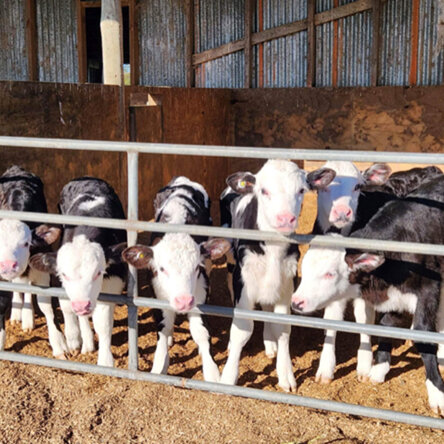Franklin Vets
Franklin Vets - excellence in veterinary care for dairy, farming, lifestyle, equine and household pets. BESTPRACTICE ACCREDITED NZ.
Your account is powered by Storbie. To edit your profile visit my.storbie.com
Your account is powered by Storbie. To edit your profile visit my.storbie.com

In case you need a refresher, theileria is a disease that only affects cattle and is caused by a parasite that lives in the blood. This parasite is spread via ticks and was first noted with large-scale outbreaks in 2012 but is now very much endemic (regularly occurring) in the North Island with the majority of animals being exposed.
The disease is now most often seen around September through to October in young stock, more often than not when calves are at foot. This is when the ticks reach the first stage of their lifecycle where they can bite therefore this is often the first opportunity for young calves to be exposed. You may notice calves lagging behind when mustering, some may seem to be gasping for breath or struggling to breathe. You may have a few unexplained deaths in your calves that could be attributed to theileria and it can impact growth rates at the time of infection.
Theileria is often diagnosed through a clinical exam and blood testing. Unfortunately, there is no treatment for those who are sick with theileria. All we can do is manage the disease by minimizing stress, as well as making sure animals have high-quality food and clean water. In some animals, a blood transfusion can be considered. Treating the ticks is often unproductive as they only need one bite from one tick to become infected with theileria and often when we see illness they are already infected.
However, as many say health is wealth! And one of the best ways to avoid the pitfalls of theileria is to ensure your calves are healthy and have a good immune system to fight this disease. One of the most important ways of doing this is by keeping animals in good condition and well fed. And often in calves, this starts with the dam. Making sure she is well fed and achieving those calving body condition score targets is paramount. This ensures that the calves are fed well and can better cope with these disease challenges. Another option to consider is the use of an immune supplement such as Multimin.
Multimin is an injectable supplement that is a great immune booster for cattle of all ages containing Copper, Selenium, Zinc and Manganese. In particular, multimin has been shown to boost immunity in young calves and can be given to animals from 1 day of age and can also be given at weaning. Clinical trials found that the use of multimin reduced disease in calves by 52% and reduced deaths by 58%. Therefore with that in mind for the past few years, some of our drystock farmers who have had fatalities in calves prior to weaning have been using multimin in their calves and found improvements in weaning percentages. Although this is just anecdotal evidence, if you have a known issue with theileria or are losing a few calves a year prior to weaning you may find some benefits in using this product. If you have any further questions please do not hesitate to contact your local vet otherwise enjoy the sunshine and keep an eye out for that pesky theileria.
Dr Amber Rowan-Sanders BVSc - Farm Vet at Taupiri
Franklin Vets - excellence in veterinary care for dairy, farming, lifestyle, equine and household pets. BESTPRACTICE ACCREDITED NZ.




